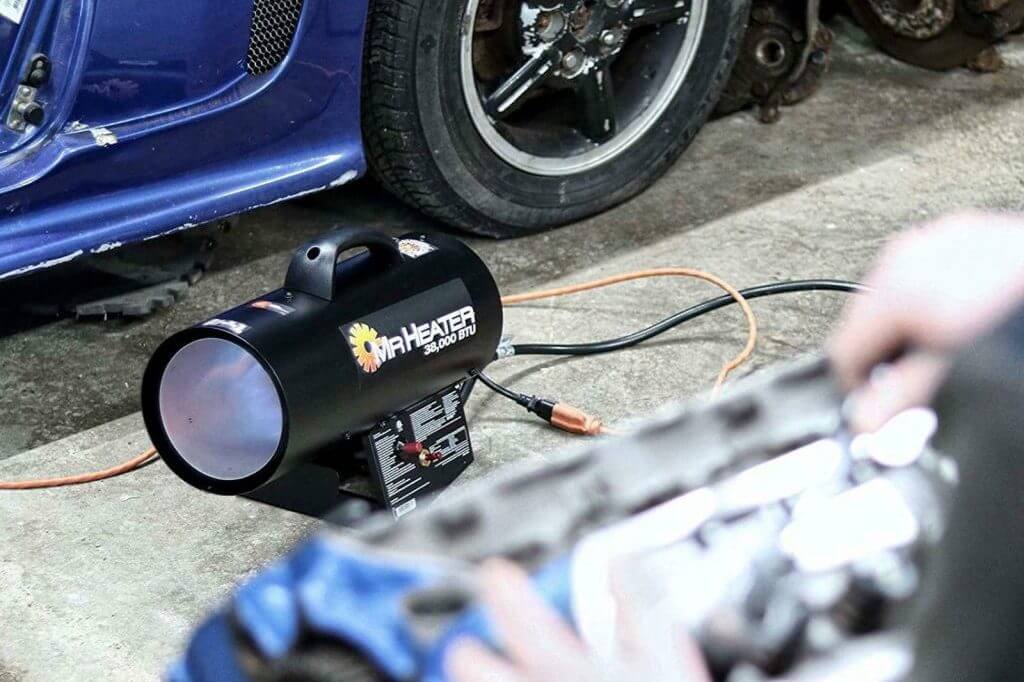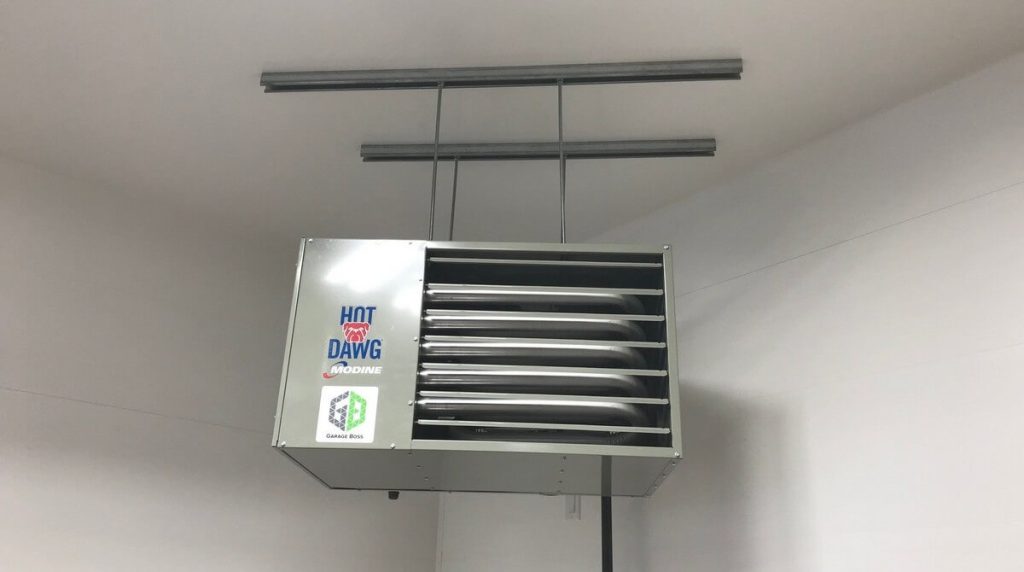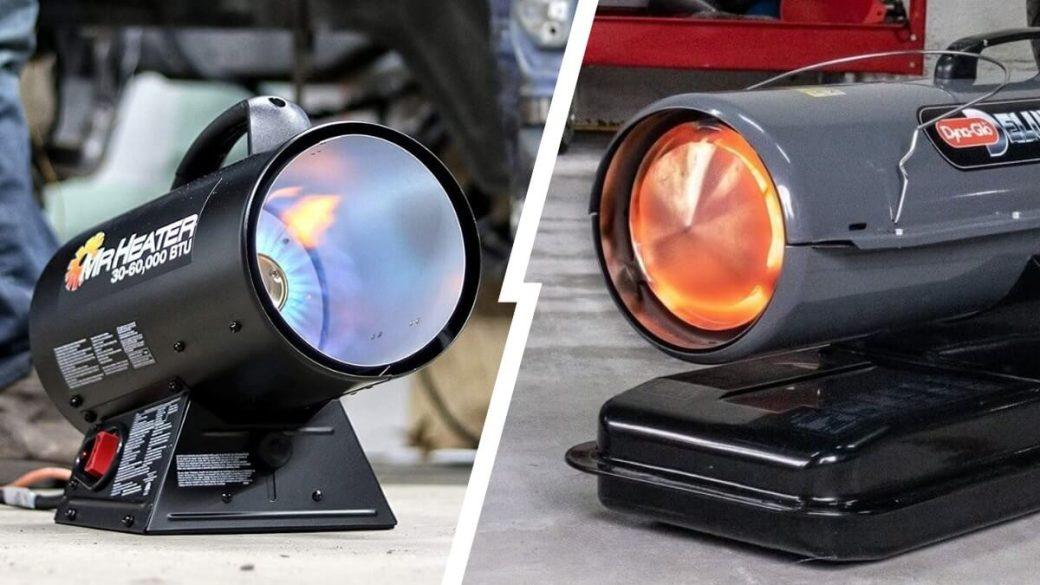👉 Looking to buy a garage heater but not sure where to start? Take a look here! 👈
There’s no denying it; the garage tends to be one of the coldest places in the house. Insulation is usually not up to par with the rest of your home, most walls face the outdoors and the huge garage door lets cold enter quite a lot when opened. As a result, working in your garage in winter can become a very uncomfortable experience. I’ve hurt myself too many times when working with cold hands, and even gloves didn’t help in some situations. Oh, and working with a heavy winter jacket on is never pleasant — trust me, I’ve tried that.
Not to worry, though; there’s a straightforward solution, and it’s called a garage heater (yeah I know, it’s not really rocket science lol). Still, a decent heater is enough to make your workshop area cozy in the winter without being too expensive to run. The problem, though, is that you’ll come across two types of garage heaters — propane and kerosene (of course, you could also go for an electric model but those bring a whole other set of pros and cons. More on that here).
So, which one is better — propane or kerosene? In my personal experience, both have their advantages and disadvantages and may be a better option depending on several factors. Consequently, we have created this comprehensive buying guide to help you find out which is best for your specific garage. We’ll go over each model’s pros and cons, the main differences between both, and why you should go for one and not the other.
Enjoy!
Table of Contents
Differences Between Propane and Kerosene Garage Heaters
Heat Content
The heat content in both units differs, with kerosene fuel having a higher BTU (British Thermal Unit) rating than propane. Particularly, kerosene produces ~135,000 BTUs per gallon, while propane manages a slightly lower ~91,600 BTUs per gallon. Hence, a kerosene heater will generally be more efficient, i.e., use less fuel for the same amount of heat.
Availability
Propane is readily available almost everywhere. Kerosene, on the other hand, is only available at special depots. However, it might or might not be an issue for you depending on where you live. Try scanning your area for places selling kerosene and if there is one near you. If not, a propane heater might be your only option.
Cost
As said above, since kerosene produces higher BTUs per volume, the better efficiency also makes it cheaper to run based on current prices. However, that might change with time, as oil and gas prices tend to fluctuate wildly.
Propane Heaters
Propane garage heaters are available in various capacities, meaning you can find a unit for your garage no matter how big or small. You’ll also find both portable and stationary models online. I’d say go for a stationary one if you absolutely don’t need to move it around; stationary models are simply cheaper so no need to shell out more for a feature you don’t really need. However, if you have a larger garage and want to keep the heat source close to you as you move around, you should definitely go for a portable model.
On that note, propane heaters are especially fitting if you have an existing propane tank at home. I have one right outside my garage, and honestly, I wouldn’t bother with kerosene heaters just because of that. I fill my large 100-gallon tank occasionally, and I have enough for days on end.
Still, if the house I bought didn’t already have that large tank already installed by the previous owner, I would surely have considered the kerosene option. Sure, propane heaters can run on portable tanks (basically the same thing you use for your BBQ), but remember that propane is generally less efficient than kerosene, so you’ll be paying more for fuel in the long run.
Types of Propane Heaters
Radiant
Radiant heaters have emitter tubes radiating heat into the surrounding area. They are generally slower and take longer to warm up the area. However, once they do, radiant propane heaters are great at keeping your garage space warm. As a result, they work quite well if you keep them on all the time but if you turn your heater off every night, they may take a while to bring back the temperature to a comfortable level the next morning.
Still, if you are one of those mechanics that wants an instant and direct source of heat to feel cozy as soon as you enter your garage, radiant heaters might not be the best option.
Forced Air
Forced air propane garage heaters use a fan blowing air over a heating element, circulating the warmth around the room. Because of the simple build, they are lightweight, portable, and warm larger spaces rather quickly. They are very convenient and straightforward to use, making them perfect for warming big garages in a jiffy. Besides, you can direct the warm air toward you for maximum comfort.
Read more: 5 Best Gas Garage Heaters to Keep You Warm This Winter
Convection
A convection heater generates heat upward, with a small fan gently blowing the air across the heat source and then around the garage. Although the amount of heat they can produce is often lower than other types, they are better at evenly warming up an entire room.
Operating Cost
One thing that makes propane cost-effective is the ability to control the heat output. However, the cost of propane fuel is unstable (I’ve seen it drop and rise dramatically over the years) and also differs based on location. Hence, it’s a bit tricky to estimate how much it would cost for you — you’ll have to do your own research for this one; sorry.
Concerns
- Propane heaters may not work properly at high altitudes, possibly at an elevation higher than 4500 feet.
- Combustion process result in Carbon Monoxide (CO) production; hence, you have to ensure proper ventilation here.
- Faulty tanks and gas lines can leak propane in your garage, and any spark from one of your tools could ignite it. Thus, it’s crucial to regularly inspect the tank and gas lines for leakage. Now, propane as a gas is odorless, but any commercial propane in the US has a rotten-egg smell chemical due to the addition of Mercaptan in the composition, so you can easily tell if it leaks. If you smell propane, first ventilate the area properly and take the tank out (if possible). If your tank is stationary, make sure you call an expert to repair it right way!
- Propane price is usually unstable.
Pros
- Very cost-effective to buy and own
- Ignites instantly
- Very efficient heating
- Easy to operate
- Some models are portable
Cons
- Can be a fire hazard
- Needs good ventilation

Kerosene Heaters
Kerosene heaters are designed to be used indoors and outdoors, making them versatile for garages and workshops. However, the main advantage of these units, in my eyes, is safety. Namely, kerosene is a liquid, and if it spills, you’ll definitely see it and smell it. Then, it’s easy to just wipe the floor clean, and it’s even easier to find leaks. Of course, you’ll still need to be careful — kerosene is flammable but much less than propane.
Furthermore, kerosene heaters tend to be far more portable, allowing you to transport them with relative ease from one location to another.
Types of Kerosene Heaters
Forced Air
Forced air kerosene heaters have a cylinder body blowing hot air into the room, thus warming the atmosphere. Such a design brings a greater spread, making it ideal for larger garages (also works really well if you gotta work on a vehicle outside).
The main disadvantage is that these heaters may be quite noisy since they’re designed like jet engines. Forget about listening to your favorite tunes with forced-air kerosene heaters — or you’ll have to use a pretty powerful garage radio lol!
Radiant
Radiant kerosene heaters produce localized heat by reflecting infrared heat waves. These heaters aren’t very responsive and thus, take more time to heat up a whole garage. However, just like propane-powered models, once they are up to speed, they do a pretty good job.
Convection
Convection heaters emit heat in all directions, and as a result, will heat up larger areas more evenly. They are also great at keeping the temperature steady but slower to warm your space up initially. You’ll recognize them by their distinctive circular tower with safety grillwork.
Read more: 5 Best Kerosene Heaters For Garage
Operating Costs
The fluctuation in fuel prices also affects kerosene. However, how much you spend majorly depends on the heater’s fuel consumption, which differs depending on the type.
Also to keep in mind is the amount of BTU being produced. For example, smaller heaters generate between 10 000 and 25 000 BTU. In comparison, bigger heaters can easily double that figure and more.
As a rule of thumb, note that the cleaner and more efficient the combustion the better. In the long run, it will save you money while also providing better heat coverage.
Concerns
- Proper ventilation is also required here since kerosene combustion also release toxic carbon monoxide.
- The heater should be stored carefully and adequately; kerosene is highly flammable and could be a significant fire hazard (although less than propane).
Pros
- Highly-efficient heating
- Most models are portable
- Ignites quickly
- Cost effective solution
Cons
- Prone to fire (just like propane)
- Requires proper ventilation (also just like propane)
Read more: Garage Heater Sizing Guide to Heat Your Garage Efficiently
Which is Safer: Propane or Kerosene?
Both propane and kerosene heaters use combustion to produce heat, reacting with oxygen from the surrounding air. When these fuels burn, they create various toxic gases, including carbon monoxide. Too much carbon monoxide is a serious health hazard, so it’s very important to keep your garage well-ventilated.
As a general rule, propane garage heaters burn much cleaner than kerosene ones and produce less carbon monoxide. You’d still need to ventilate the garage, but less so than with a kerosene heater. Still, you can always reduce the risk of a kerosene model with a robust ventilating system.
On the other hand, propane is more flammable than kerosene, and since it’s in a gaseous state, it could fill your garage rather quickly if there’s a leak, creating a serious fire hazard.
Both are dangerous, though, so be sure that you make the necessary safety precautions every time you use one.
Want to completely eliminate that risk? Go for an electric garage heater instead.
Which is More Accessible: Propane or Kerosene?
In general, propane is more widely available. You can purchase propane tanks from convenience stores, supermarkets, and home improvement retailers. Also, several propane suppliers offer propane tank rentals. You can bring your smaller empty tank back and they will replace it with a full one. For a bigger, stationary tank, the supplier will come to refill it directly at home — what’s not to like?
As for kerosene, small tanks are relatively easy to come by and may be found in most hardware stores. However, you might get a better rate at a gas station equipped with a kerosene pump. Unfortunately, they are not available everywhere, so make sure there’s one in your area.
Which is Cheaper: Propane or Kerosene?
The price of fuel is not stable and is affected by various factors, including supply and demand, speculation, and world events. While you may compare prices online, keep in mind that they may differ depending on where you live. In general, though, kerosene is slightly more expensive than propane.

Propane vs. Kerosene: Which is better?
| Kerosene | Propane | |
|---|---|---|
| Safety | Kerosene combustion produces a significant amount of carbon monoxide gas and of course, kerosene is highly flammable. | Propane heaters produce less carbon monoxide, although they still produce some. Propane is also highly flammable. |
| Availability | Not available everywhere. | Readily available in most hardware stores. |
| Fuel Cost | Kerosene is currently a bit more expensive than propane, although it has a higher BTU rating. | Propane is slightly cheaper at the moment. However, it was actually more expensive in the past. |
| Heater Cost | Kerosene heaters are available in different types but are still significantly more expensive than propane garage heaters. | They are also available in different types but are generally more budget-friendly. They are one of the most reasonably priced units on the market. |
Frequently Asked Questions (FAQs)
Which is better? Kerosene or Propane?
Despite their differences, the choice between the two really boils down to your needs and personal preferences. When deciding between garage heaters, consider the space you need to heat up, the availability of propane or kerosene in your area, and the amount of ventilation in your garage.
How much propane does it take to heat a garage?
The rate at which the heater will burn fuel will vary based on how big your garage is, the temperature you want it to reach, the atmospheric temperature, and the quality of your garage’s insulation. But since every heater model burns fuel at a different rate based on how powerful they are, that’s a specification you’ll find in the heater’s spec sheet
Read more: Best Garage Door Insulation Kits to Heat and Cool Your Workspace On the Cheap
Do kerosene and propane heaters produce carbon monoxide?
Yes, carbon monoxide is a by-product of pretty much any combustion process.
Is it safe to use a kerosene heater in a garage?
The construction of the heaters makes them safe to be used in the garage, assuming it doesn’t leak. Consequently, make sure to regularly inspect the tank and gas pipes and ensure your garage is well-ventilated.
Last Words
Propane and kerosene heaters are pretty similar, and both offer an economical and efficient way of warming up your garage. Hence, the ultimate decision comes down to your specific requirements, personal preferences, and of course, your budget. Run through all advantages and disadvantages pointed out in this article and weigh them out. After all, a heater is a significant investment and will last you for years — you really don’t want to be stuck with a model that doesn’t do what you expect it to do.
If you’re concerned about fuel cost, propane is currently cheaper, although the difference is negligible, since kerosene produces more heat per gallon. With that said, propane heaters are usually cheaper and require less maintenance, while kerosene is ideal if you need to heat your garage quickly, assuming you can find kerosene suppliers where you live.







